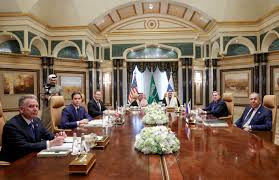The International Monetary Fund (IMF) has asked the government to bring about massive fiscal adjustments amounting to Rs1,150bn to cut the budgetary deficit at 0.4% of the GDP.
The $6 billion Extended Fund Facility (EFF) could only be revived provided the government demonstrates its ability to present and pass the next budget for 2020-21 to align with the IMF’s envisaged macroeconomic framework.
Any major deviation from the path of ‘fiscal discipline’ could derail the IMF programme by creating problems for completion of the second review and release of third tranche worth $450 million under the Fund’s EFF programme that was halted after the outbreak of COVID-19 pandemic because the economic realities of the country had changed massively.
The IMF extended $1.4 billion under the Rapid Fund Instrument (RFI) to support and compensate Pakistan in the post coronavirus situation. Now Pakistan is seeking major relaxations in primary deficit/fiscal deficit targets to revive the stalled programme and it will be an achievement of the government if it convinces the IMF to allow a hike in the budget deficit as well as the primary deficit for the next budget 2020-21.
The IMF prescription suggests that Islamabad requires massive fiscal adjustments of 2.5% of the GDP for bringing down its primary deficit from negative 2.9% of GDP to negative 0.4%, equivalent to almost Rs 1,150 billion in the next budget through different measures including the freezing of salaries and defence budget.
“When G20 countries can cut down salaries of their public sector employees, why can’t Pakistan do it,” the IMF side raised the question before Pakistani side and argued that “charity begins at home” so the government must show its discipline before pursuing others and for creation of fiscal space for diverting resources towards combating COVID-19 pandemic.
Pakistani authorities have replied that the inflation remained in double-digits and freezing of salaries did not seem like a feasible option. The government said that inflation has impacted the salaried class the most and 10-15% increase in salaries and pensions was inevitable.
Pakistani has argued that the primary deficit could not be brought down in such a massive manner in one stroke. They suggested that the primary deficit could be reduced from a negative 2.9% of GDP to -1.2% of GDP in the next budget. The IMF envisages overall budget deficit at 6.6% of GDP for next budget 2020-21 against revised estimates of 9.6% of GDP for the outgoing fiscal year. Pakistani authorities told the IMF team that the budget deficit could be brought down 8 to 9% of GDP in the next fiscal year.



















































